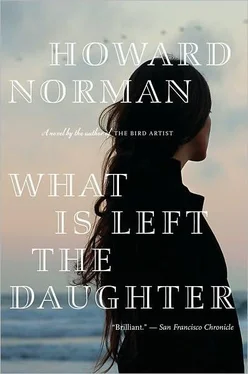"That's fine. You're welcome."
"What happened out there, do you think?"
"Hard to say. She really got worked up."
"Worked up?"
"Maybe too much wind got in her ears. Maybe she should've been wearing a hat pulled down over her ears, Hans, I don't know. She went all out, I can tell you that much. Tilda really earned her keep."
"Wyatt, do you know what time the first bus leaves tomorrow morning?"
"I think eight-forty."
"All right. Now I'm returning upstairs."
"Why ask the bus schedule?"
"It might be a good time to leave for a while."
"To where?"
"I was thinking Prince Edward Island. I studied its location on the map."
"Hans, a U-boat recently attacked a civilian ferry in the Northumberland Strait, along Prince Edward Island. The memory of that has to still be fresh up there, is my guess. I'd study your map again if I were you."
"Yes. I see. Now I'm going upstairs."
I drove toward my house with no small amount of dread, but almost right away I discovered, in my coat pocket, the envelope containing Tilda's fee. I turned the car around, drove back to the bakery and left the envelope with Cornelia, asking her to give it to Tilda at her nearest convenience. Then I drove even more slowly back home. When I got there, two trucks and one car were parked out front. Just inside the front door, I heard the radio: " — and what heroic measures are needed in the face of such atrocities—' " Loud static for a moment. " — the escort ship Grandmere searched the area for survivors. Those fortunate ones told of the screams and cries for help they heard all night in the darkness …" Static and more static.
Scowling and cursing, my uncle adjusted the dial, but the static prevailed. He turned to the other men at the table, offered a downward smile and said, "You probably didn't know, but my Constance couldn't swim."
Then he saw me and right away turned down the volume on the radio. He looked to have a week or more stubble of beard. He was wearing the same clothes he'd worn to Steven Parish's shop the day before. There was a bottle of whiskey on the table. "We're bivouacked here with the radio," he said. "Where's your manners, Wyatt? Shake hands with our guests."
Simon Perkins, whose lobster boat was named Sprightly, stood up and we shook hands. I shook hands with Warren Heddon, who was the proprietor and cook at the Glooskap Restaurant in Parrsboro, and as my uncle once put it, "Me and Warren have shared thirty-some years of Sunday breakfast, and not once late to pick up our wives and children at church and spend the rest of Sunday with them." I shook hands with Miller Shiers, a house painter, who had famously painted Reverend Witt's church in three days' time, including two nights without sleep, using lanterns hung on his ladder to work by. There had been no particular rush or reason for him to paint the church like that, except, as Shiers said, he'd simply decided to. I shook hands with Gus Breel, who was the constable serving eleven neighboring villages. He'd been born in Upper Economy, and had, in his fifty-six years, lived only in Upper Economy, Middle Economy and Lower Economy, and had been married and divorced in each place. Cornelia had said, "You know, they should name a new village after Gus Breel. There'd be Upper Economy, Middle Economy, Lower Economy — and then for Gus's sake they could add Just Plain Broke."
Looking at these men at our kitchen table, I said, "I don't ever remember this many people in the house since Tilda's eighteenth birthday."
"So much for pleasant conversation," Donald said. "Because as the situation now stands, our concern's not who's here as much as who isn't. "
The room fell silent. Then Warren stood and said, "Well, Donald, we just wanted to sit here with you." The others nodded in agreement. Warren, Miller, Simon and Gus filed out of the kitchen. I heard their car and trucks start up in quick succession.
"Our last night together, Constance slept in the shed with me," my uncle said. "If that isn't something, nothing is."
And it was at that precise moment the telephone rang. My uncle stood and answered it on the third ring. He did not say hello. I could hear a voice at the other end inquire, "Is this the residence of a Mrs. Constance Bates-Hillyer, please?" Stretching the cord to its full length, my uncle stood at the counter and faced the cupboard. I sat down at the table.
"Yes, this is her husband, Donald Hillyer," he said into the receiver.
Marlais, I can tell you that my mind was a whirligig. The room was spinning. I didn't want to hear, I didn't want to hear, and then I heard: "Well, now, Secretary Macdonald, just because my Constance's wardrobe trunk was recovered, doesn't necessarily mean—" My uncle listened a moment, then moaned from deep in his gut and more or less reeled backward against the kitchen table, finally crumpling to the floor. He looked up at me. "Nephew, Secretary of the Navy Macdonald has personally called just now, and he's informed me that Constance Bates-Hillyer is officially numbered among the missing."
Quickly, then, my uncle was alerted to a different voice on the telephone, and he pressed his ear close to the receiver. "Not the slightest room for doubt," he said. "I understand." He stood up, leaned against the table for balance and handed me the telephone, which I hung up.
My uncle sat at the table. "We never went to a walk-in cinema together," he said. "And last time we were in Halifax — when was that? — 1939, I believe. March 1939, two nights at the Hotel Dumont, breakfast included free of charge and no limit to how long a patron could sit in the lobby. Constance snuck out during my nap and took a dance lesson from the in-house instructor — the foxtrot at her age! Now, I know that might not sound like something your aunt Constance would sneak out to do. But she knew I wouldn't have taken any dance lesson. Besides, I had my nap to take. I asked her how much of the foxtrot you can really learn in one lesson. 'As it turns out, quite a bit,' she said. Showed some temper, too. We ate supper at the hotel, and we were finished with time to spare. The cinema was just three blocks from the hotel. I really don't know why we didn't walk over and take in a picture."
My sense was, all this sadness and regret provided a calm interlude. I knew it couldn't last long.
"Uncle Donald, might they return Aunt Constance's wardrobe trunk?" Honestly, this question served no good purpose, but it was all I could think to ask.
"Now, right there, Wyatt, is a true blessing," he said. "That is a true spot of grace in all this. Because Navy Secretary Macdonald's assistant said the wardrobe trunk will arrive here by bus. They promised."
"A keepsake," I said. "For Tilda."
"What's best for me now, Nephew, is to go out to my shed. I can do some sanding. I can sand for an hour or two and think. Plus, I have my own radio out there, as you know."
"I'd like to work out there with you, Uncle Donald."
"You know what I think? It's possible my Constance isn't going to be found in all of eternity," he said. "We should cobble together a family this evening, is what I think. Will you invite Tilda and her husband for me?"
"Listen," I said, "do you know what Hans Mohring did? Out of his own pocket, he bought new copies of just about every one of the gramophone records you smashed to pieces, Uncle Donald. He bought them at Ballade and Fugue."
"German-owned record shop?"
"No, sir, the owner's name — you go back and read the newspaper article, Uncle Donald. The shop owner who those RCN beat up — Randall Webb is not German."
"Consorted with them, though."
"You like Beethoven, Randall likes Beethoven," I said. "Uncle Donald, please listen to what I'm saying. The important thing: Hans glued the pieces together and figured out which they were. Maybe it was as much to please Aunt Constance as anything. But he specifically said he did it to make amends with you."
Читать дальше












